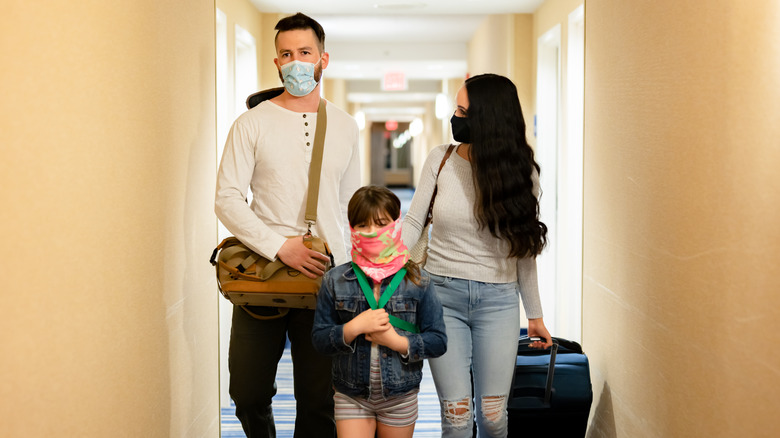Why You Might Get Kicked Off A Cruise Ship For Getting Sick
Joining a cruise means embracing the reality that what is essentially a floating hotel will be your home for days or weeks at a time. You must be comfortable with the fact that you won't see land for long stretches, and you'll need to adapt to living in that nautical bubble. Since cruises take their sweet time, cruise lines generally avoid kicking passengers off until the scheduled port of call. And they don't boot passengers unless there's a good reason. Common offenses include behaviors that drive their cruise joiners up the wall, including, but not limited to being rowdy and reckless, exhibiting hostility towards the staff, and smuggling prohibited items. Another reason? Getting seriously sick. Yes, really.
But don't worry, you will not get the boot for fighting something as common as seasickness or heading to the infirmary to treat your nausea. It takes more than feeling queasy to get kicked off a cruise. You'd need a severe condition that the onboard medical staff can't handle, requiring immediate medical attention. In that case, you'll be evacuated, either at the next port of call or via an airlift.
Surprisingly, this isn't as rare as you'd think. In May 2024, The Washington Times reported that the U.S. Air Force had to airlift a 12-year-old boy from a Carnival ship sailing the East Coast after he ruptured his bowel and therefore needed emergency surgery. Since the ship was in the middle of the ocean, authorities had to step in to evacuate him immediately.
You'll only be evacuated from a cruise for severe sickness
While cruise ships typically boast onboard medical facilities and an on-call medical team, let's be real: They can only do so much with limited resources. But don't underestimate them, either. Their facilities, especially those in bigger ships, can handle a range of conditions, almost like a mini-ER at sea. Dr. Joe Scott, senior director of fleet medical operations at Carnival, told USA Today that they are even equipped to deal with heart attacks. "There really isn't (anything) we can't treat, at least for the first few hours," he said.
But because of resource limitations, the medical team can only provide temporary treatment for severely ill passengers until they can reach a better-equipped facility. That's when the passenger will be "kicked off," as advised by the doctors. They're the ones who will give the go signal if a medical evacuation can wait until the next port or if authorities need to airlift the patient mid-ocean. Sometimes, the cruise even makes an unscheduled stop to accommodate a patient. In April 2024, the Department of Marine and Ports Services in Bermuda reported that an Oasis of the Seas cruise ship sailing from Miami to Cadiz had to divert to Bermuda to transfer a 69-year-old passenger requiring urgent care at a hospital.
Traditional health insurance may not cover medical evacuation
If you get sick on a cruise and need treatment from the medical team — or worse, require a medical evacuation — don't count on your traditional health insurance to swoop in and save the day. For instance, Royal Caribbean's policy states that "land-based health insurance" isn't accepted, and passengers must pay in full for any medical services provided. Sure, they encourage you to claim reimbursements from your insurance provider later, but good luck with that.
This is why securing travel insurance before booking a cruise — or any type of travel, for that matter — is crucial. "This will facilitate reimbursement if they do incur charges and potentially cover a costly medical evacuation if needed," Joe Scott, chair of the cruise ship medicine section of the American College of Emergency Physicians, shared with NPR.
But don't just grab any insurance off the shelf. Meghan Walch, Director of Product at insurance comparison website InsureMyTrip, told USA Today that travelers must scrutinize the plan to understand what's covered before making a purchase. "If an incident does occur where medical attention or an evacuation is needed, the traveler would want to get in touch with the emergency assistance provider associated with their policy," she said. "The necessary care can be arranged once at port... Failure to notify the assistance provider could affect what is covered." In short, do your homework, get the right insurance, and make sure you're covered for every possible scenario — even the ones you hope never happen.


